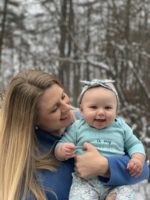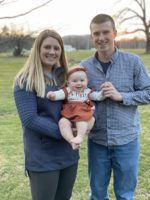 At 30 years old, Brylie Young of Fryeburg, Maine, never thought she would be diagnosed with a congenital heart defect shortly after giving birth to her first child in April 2022. She says she was fortunate to have an uneventful pregnancy and birth of her daughter. She and her husband, Alec, were so excited to begin this new chapter in their lives. But little did they know, they were about to embark on an unexpected journey.
At 30 years old, Brylie Young of Fryeburg, Maine, never thought she would be diagnosed with a congenital heart defect shortly after giving birth to her first child in April 2022. She says she was fortunate to have an uneventful pregnancy and birth of her daughter. She and her husband, Alec, were so excited to begin this new chapter in their lives. But little did they know, they were about to embark on an unexpected journey.
When being discharged, the OB/GYN heard what sounded like a heart murmur. Young had never been told she had a murmur before, and she was told sometimes fluid changes after giving birth can mimic a murmur. To err on the side of caution, her OB/GYN and primary care physician monitored the murmur and she was referred to a cardiologist and was scheduled to have an echocardiogram (echo) as well. An echo uses high frequency sound waves (ultrasound) to make pictures of your heart. The murmur continued to sound better and when she saw the cardiologist a few weeks later, they could no longer hear it.
Though everything sounded fine, and she continued to have no signs or symptoms, her cardiologist said she should still have the echo done just to make sure everything was alright. She had the echo performed a couple of days later and it showed the right chambers of her heart were dilated due to an atrial septal defect (ASD) which would require more tests.

Next, she underwent a Transesophageal Echocardiogram (TEE) – a special type of ultrasound “movie” of the heart that produces much clearer pictures than a standard echo. For this procedure, a long tube with a small ultrasound “camera” on the end, called a TEE probe, is inserted in your esophagus.
She was diagnosed with sinus venosus ASD, a less common defect, which required surgery to fix it. So, here she was, three and a half months after giving birth and receiving open-heart surgery to correct and repair the ASD and a Partial Anomalous Pulmonary Venous Return. The increased blood flow to the right side of her heart also resulted in her tricuspid valve slightly beginning to leak so a clip was placed on that as well. During the surgery, which lasted more than six hours, she was placed on a bypass machine.
Needless to say, her family was shocked. She says she realized how lucky she was that both her and her husband have lots of family and friends close by to support them for the many challenging weeks following the surgery. Imagine the emotions of a new mom not being able to hold her newborn for six weeks as she had to avoid any lifting as she recovered. It was not until her daughter was about 10 weeks old that she could pick her up. Though she is so grateful for the support, asking family and friends to help was not easy.
“I often think back to all that I have been through this last year and I’m still in awe. It was one of the most challenging times in my life, but I am also so thankful for it. If there wasn’t the routine check one last time before being discharged after giving birth and I hadn’t of had my daughter in the first place, I would still have no idea that I had a congenital heart defect and who knows what would have happened in the future. I am so grateful not only for my daughter making me a mom, but for also possibly saving my life,” said Young.
A three-sport athlete growing up, she chose a career in Strength and Conditioning. She didn’t have any signs or symptoms from her defect during those years and activities, such as a difficulty breathing and fatigue. She found she was breathing more heavily when doing everyday tasks as she recovered, which is normal. Young had physical therapy to help build her strength again. She has continued to improve and says she is about 90% back to normal now.
“Go Red for Women, for me, means support and education surrounding heart disease for women,” said Young. “It is a group of individuals who may have had similar or different heart journeys, but together they can support each other and help to continue to educate others on this important topic. It is also an opportunity to pay it forward. I was extremely fortunate to have such an amazing support system of friends and family, but in addition to this I had someone share their heart story with me just before surgery and continued to check on me after. To have someone who completely understands what you are going through physically, mentally, and emotionally makes a world of a difference. I hope at least one person will hear my story and be able to relate to it in some way and it helps them feel supported and not alone.”